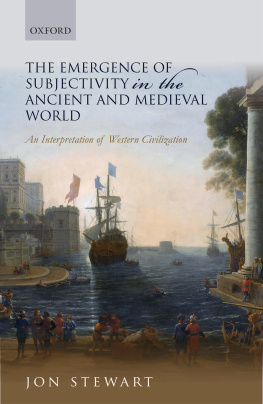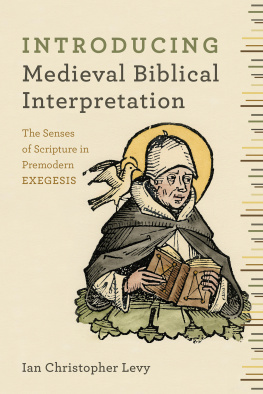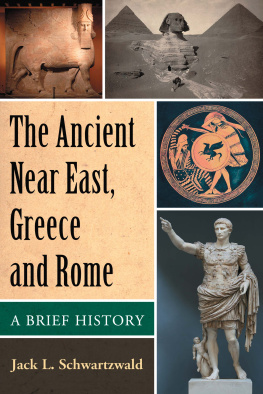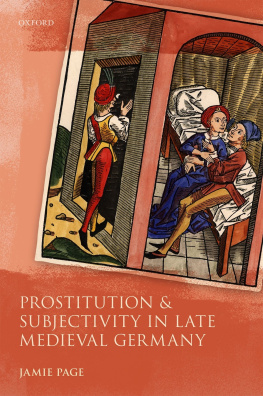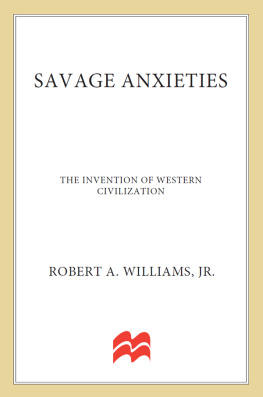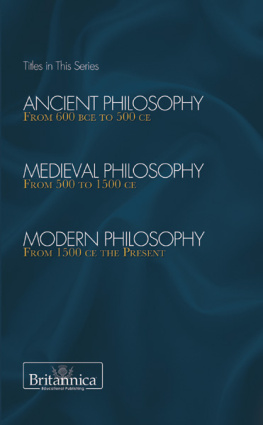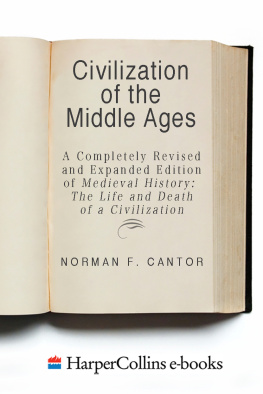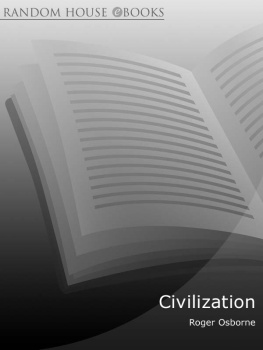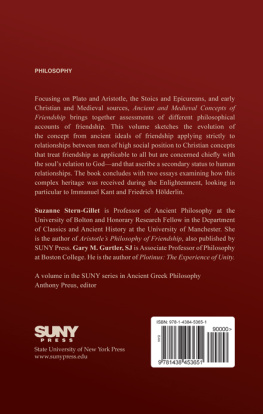Stewart Jon - The Emergence of Subjectivity in the Ancient and Medieval World: An Interpretation of Western Civilization
Here you can read online Stewart Jon - The Emergence of Subjectivity in the Ancient and Medieval World: An Interpretation of Western Civilization full text of the book (entire story) in english for free. Download pdf and epub, get meaning, cover and reviews about this ebook. year: 2019, publisher: Oxford University Press USA - OSO, genre: Religion. Description of the work, (preface) as well as reviews are available. Best literature library LitArk.com created for fans of good reading and offers a wide selection of genres:
Romance novel
Science fiction
Adventure
Detective
Science
History
Home and family
Prose
Art
Politics
Computer
Non-fiction
Religion
Business
Children
Humor
Choose a favorite category and find really read worthwhile books. Enjoy immersion in the world of imagination, feel the emotions of the characters or learn something new for yourself, make an fascinating discovery.
- Book:The Emergence of Subjectivity in the Ancient and Medieval World: An Interpretation of Western Civilization
- Author:
- Publisher:Oxford University Press USA - OSO
- Genre:
- Year:2019
- Rating:3 / 5
- Favourites:Add to favourites
- Your mark:
- 60
- 1
- 2
- 3
- 4
- 5
The Emergence of Subjectivity in the Ancient and Medieval World: An Interpretation of Western Civilization: summary, description and annotation
We offer to read an annotation, description, summary or preface (depends on what the author of the book "The Emergence of Subjectivity in the Ancient and Medieval World: An Interpretation of Western Civilization" wrote himself). If you haven't found the necessary information about the book — write in the comments, we will try to find it.
Stewart Jon: author's other books
Who wrote The Emergence of Subjectivity in the Ancient and Medieval World: An Interpretation of Western Civilization? Find out the surname, the name of the author of the book and a list of all author's works by series.
The Emergence of Subjectivity in the Ancient and Medieval World: An Interpretation of Western Civilization — read online for free the complete book (whole text) full work
Below is the text of the book, divided by pages. System saving the place of the last page read, allows you to conveniently read the book "The Emergence of Subjectivity in the Ancient and Medieval World: An Interpretation of Western Civilization" online for free, without having to search again every time where you left off. Put a bookmark, and you can go to the page where you finished reading at any time.
Font size:
Interval:
Bookmark:


Great Clarendon Street, Oxford, OX2 6DP, United Kingdom
Oxford University Press is a department of the University of Oxford. It furthers the Universitys objective of excellence in research, scholarship, and education by publishing worldwide. Oxford is a registered trade mark of Oxford University Press in the UK and in certain other countries
Jon Stewart 2020
The moral rights of the author have been asserted
First Edition published in 2020
Impression: 1
All rights reserved. No part of this publication may be reproduced, stored in a retrieval system, or transmitted, in any form or by any means, without the prior permission in writing of Oxford University Press, or as expressly permitted by law, by licence or under terms agreed with the appropriate reprographics rights organization. Enquiries concerning reproduction outside the scope of the above should be sent to the Rights Department, Oxford University Press, at the address above
You must not circulate this work in any other form and you must impose this same condition on any acquirer
Published in the United States of America by Oxford University Press
198 Madison Avenue, New York, NY 10016, United States of America
British Library Cataloguing in Publication Data
Data available
Library of Congress Control Number: 2019952268
ISBN 9780198854357
ebook ISBN 9780192596352
DOI: 10.1093/oso/9780198854357.001.0001
Printed and bound in Great Britain by Clays Ltd, Elcograf S.p.A.
This work is dedicated to the memory of Thomas Posch (19742019).
The present investigation is designed to be read on its own, but it can also be used as a companion to the many interdisciplinary humanities courses taught at the university level. The work offers analyses of a number of foundational texts in the Western tradition that are often assigned in such courses. The individual chapters can be read either collectively, as a part of the broader narrative about the development of the tradition, or individually, as commentaries on the specific texts that they treat.
This study does not pretend to represent a new contribution to the specialized secondary literature on the individual texts, authors, or periods treated. Its ultimate goal is rather to provide a synoptic view. With that said, the investigation is informed by the recent developments in the different fields and attempts to sketch these in a general way for the reader. At the beginning of the individual chapters, an effort has thus been made to give a brief glimpse of the tradition of modern scholarship on the work under examination. The goal with these introductory discussions is to provide the reader with a greater appreciation of the problems with the texts that scholars have traditionally struggled with. Moreover, these brief accounts also give some insight into the history of reception of the works and their role in the Western canon.
Sometimes there is resistance to obligatory humanities courses, and a part of the dissatisfaction arises from a sense that they are irrelevant for the modern world and are thus useless as preparation for work life. In response to objections of this kind, this study attempts to identify the universal issues in key texts from the Western canon in ways that show their continuing relevance for us today. The hope is that this will demonstrate why the material from ancient cultures can still be both valuable and interesting in the twenty-first century.
The idea for the present work arose during a research stay at the Radcliffe Institute for Advanced Study at Harvard University from 201617. The immediate occasion to return to some of the central texts from the Western canon after many years was provided by Tim Hall, who kindly invited me to develop a class on Western Civilization for Thales College, which he was in the process of creating. It was for this class that the original manuscript was written. I am thankful to Tim for offering me this opportunity. I am also grateful to Winston Brady from Thales for all of his help with the class and for many engaging discussions about the material. In that context it was also a pleasure to work with the kind Lori and Dave Mahaley.
A year later I had a new opportunity to teach the class at the Bratislava International School of Liberal Arts (BISLA) in Slovakia. This afforded me the chance to go through the material again and finalize the manuscript. I would like to thank BISLAs director Samuel Abraham for allowing me to offer this course at the college.
I would also like to express my gratitude to Finn Gredal Jensen and Katalin Nun Stewart who read different parts of the text and provided valuable feedback and suggestions. Finally, I would like to acknowledge the help of my friends and colleagues at the Institute of Philosophy at the Slovak Academy of Sciences for welcoming me to their engaged research team: Peter ajda, Rbert Karul, Jaroslava Vydrov, Frantiek Novosd, and Jozef Pauer.
As I was working on this book, I gave the following public lectures, which provided me with the occasion to try out parts of the text: Globalization and Hegels Theory of the Emergence of Subjectivity, Cultural Politics Seminar at The Weatherhead Center for International Affairs, Harvard University, December 5, 2017; The Dialectic of Subjectivity and Community in the 21st Century: The Struggle for Identity, The Liberal Herald Annual Conference, Demos vs. Polis? Responsible Citizenship in Post-Transitional Societies, Bratislava International School of Liberal Arts, Bratislava, November 23, 2018; The Discovery of Subjectivity as Reflected in Early Notions of the Afterlife, The Polish-Slovak Workshop: Individual and Collective Subjectivity: Historical and Contemporary Issues, Institute of Philosophy and Sociology, Polish Academy of Sciences, Warsaw, June 26, 2019. The text was improved by the valuable feedback that I received on these occasions.
This work was produced at the Institute of Philosophy, Slovak Academy of Sciences. It was supported by the Slovak Research and Development Agency under the contract No. APVV-15-0682.
Human beings have a basic need to understand who they are. This need becomes more urgent in times like the present when people feel a sense of alienation and anomie since many traditional values, beliefs, and institutions are in a state of crisis or have broken down altogether. One way to address this need is to study the past in order to learn how we became the kinds of creatures that we are today. The modern Western world is the product of a long tradition that began with the ancient Greeks and Romans and continued through the Christian Middle Ages. The foundational works of this tradition in the different humanities fields were influential in many ways for our globalized culture of the twenty-first century. No matter where we live or where we come from, the Western tradition, for good or ill, is largely constitutive of our identity. Living in the modern world, we are, so to speak, products of this tradition, whether we like it or not. We have been produced, moreover, in such a way that we naturally and reflexively engage with our past, inasmuch as we understand it to be carried forward in and by our present selves. We have been habituated to reflect upon the processes and mechanisms of our production. The Western tradition includes works of science, religion, literature, poetry, philosophy, etc., which can all in some sense be conceived as forms of self-reflection. We understand all of these cultural labors to be contributing influences to the production of ourselves as historically specific and contingently positioned selves. Therefore, in order to understand the modern world and our role in it, we must go back and, by means of a study of the past and its cultural artifacts, see how we arrived at where we are today.
Font size:
Interval:
Bookmark:
Similar books «The Emergence of Subjectivity in the Ancient and Medieval World: An Interpretation of Western Civilization»
Look at similar books to The Emergence of Subjectivity in the Ancient and Medieval World: An Interpretation of Western Civilization. We have selected literature similar in name and meaning in the hope of providing readers with more options to find new, interesting, not yet read works.
Discussion, reviews of the book The Emergence of Subjectivity in the Ancient and Medieval World: An Interpretation of Western Civilization and just readers' own opinions. Leave your comments, write what you think about the work, its meaning or the main characters. Specify what exactly you liked and what you didn't like, and why you think so.

